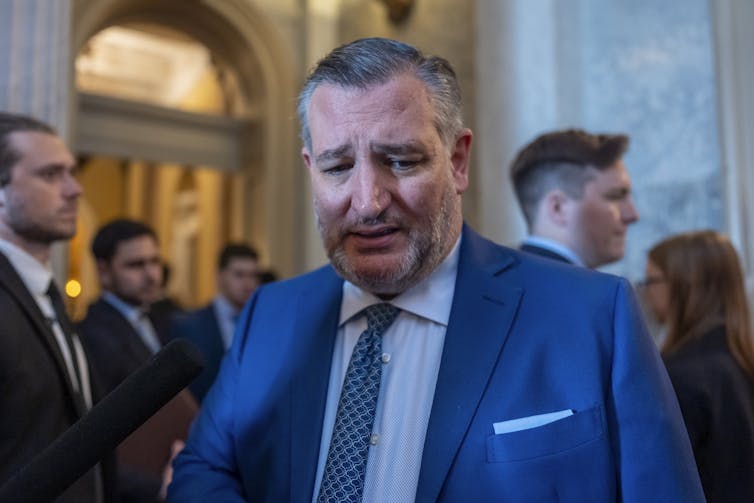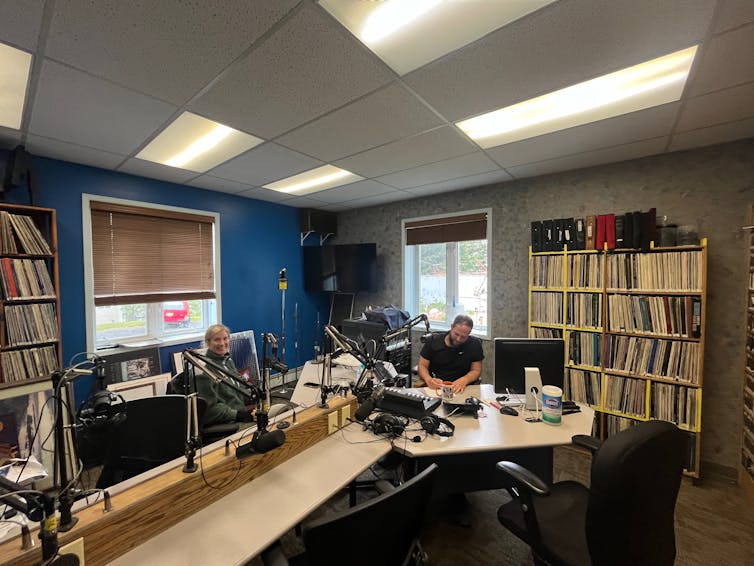
By Stephanie A. (Sam) Martin
Champions of the almost entirely party-line vote in the U.S. Senate to erase US$1.1 billion in already approved funds for the Corporation for Public Broadcasting called their action a refusal to subsidize liberal media.
“Public broadcasting has long been overtaken by partisan activists,” said U.S. Sen. Ted Cruz of Texas, insisting there is no need for government to fund what he regards as biased media. “If you want to watch the left-wing propaganda, turn on MSNBC,” Cruz said.
Accusing the media of liberal bias has been a consistent conservative complaint since the civil rights era, when white Southerners insisted news outlets were slanting their stories against segregation. During his presidential campaign in 1964, U.S. Sen. Barry Goldwater of Arizona complained that the media was against him, an accusation that has been repeated by every Republican presidential candidate since.
But those charges of bias rarely survive empirical scrutiny.
As chair of a public policy institute devoted to strengthening deliberative democracy, I have written two books about the media and the presidency, and another about media ethics. My research traces how news institutions shape civic life and why healthy democracies rely on journalism that is independent of both market pressure and partisan talking points.
That independence in the United States – enshrined in the press freedom clause of the First Amendment – gives journalists the ability to hold government accountable, expose abuses of power and thereby support democracy.

AP Photo/J. Scott Applewhite
Trusting independence
Ad Fontes Media, a self-described “public benefit company” whose mission is to rate media for credibility and bias, have placed the reporting of “PBS NewsHour” under 10 points left of the ideological center. They label it as both “reliable” and based in “analysis/fact.” “Fox and Friends,” by contrast, the popular morning show on Fox News, is nearly 20 points to the right. The scale starts at zero and runs 42 points to the left to measure progressive bias and 42 points to the right to measure conservative bias. Ratings are provided by three-person panels comprising left-, right- and center-leaning reviewers.
A 2020 peer-reviewed study in Science Advances that tracked more than 6,000 political reporters likewise found “no evidence of liberal media bias” in the stories they chose to cover, even though most journalists are more left-leaning than the rest of the population.
A similar 2016 study published in Public Opinion Quarterly said that media are more similar than dissimilar and, excepting political scandals, “major
news organizations present topics in a largely nonpartisan manner,
casting neither Democrats nor Republicans in a particularly favorable
or unfavorable light.”
Surveys show public media’s audiences do not see it as biased. A national poll of likely voters released July 14, 2025, found that 53% of respondents trust public media to report news “fully, accurately and fairly,” while only 35% extend that trust to “the media in general.” A majority also opposed eliminating federal support.
Contrast these numbers with attitudes about public broadcasters such as MTVA in Hungary or the TVP in Poland, where the state controls most content. Protests in Budapest October 2024 drew thousands demanding an end to “propaganda.” Oxford’s Reuters Institute for the Study of Journalism reports that TVP is the least trusted news outlet in the country.
While critics sometimes conflate American public broadcasting with state-run outlets, the structures are very different.
Safeguards for editorial freedom
In state-run media systems, a government agency hires editors, dictates coverage and provides full funding from the treasury. Public officials determine – or make up – what is newsworthy. Individual media operations survive only so long as the party in power is happy.
Public broadcasting in the U.S. works in almost exactly the opposite way: The Corporation for Public Broadcasting is a private nonprofit with a statutory “firewall” that forbids political interference.
More than 70% of the Corporation for Public Broadcasting’s federal appropriation for 2025 of US$1.1 billion flows through to roughly 1,500 independently governed local stations, most of which are NPR or PBS affiliates but some of which are unaffiliated community broadcasters. CPB headquarters retains only about 5% of that federal funding.
Stations survive by combining this modest federal grant money with listener donations, underwriting and foundation support. That creates a diversified revenue mix that further safeguards their editorial freedom.
And while stations share content, each also has latitude when it comes to programming and news coverage, especially at the local level.
As a public-private partnership, individual communities mostly own the public broadcasting system and its affiliate stations. Congress allocates funds, while community nonprofits, university boards, state authorities or other local license holders actually own and run the stations. Individual monthly donors are often called “members” and sometimes have voting rights in station-governance matters. Membership contributions make up the largest share of revenue for most stations, providing another safeguard for editorial independence.

Nathaniel Herz/Northern Journal
Broadly shared civic commons
And then there are public media’s critical benefits to democracy itself.
A 2021 report from the European Broadcasting Union links public broadcasting with higher voter turnout, better factual knowledge and lower susceptibility to extremist rhetoric.
Experts warn that even small cuts will exacerbate an already pernicious problem with political disinformation in the U.S., as citizens lose access to free information that fosters media literacy and encourages trust across demographics.
In many ways, public media remains the last broadly shared civic commons. It is both commercial-free and independently edited.
Another study, by the University of Pennsylvania’s Annenberg School in 2022, affirmed that “countries with independent and well-funded public broadcasting systems also consistently have stronger democracies.”
The study highlighted how public media works to bridge divides and foster understanding across polarized groups. Unlike commercial media, where the profit motive often creates incentives to emphasize conflict and sensationalism, public media generally seeks to provide balanced perspectives that encourage dialogue and mutual respect. Reports are often longer and more in-depth than those by other news outlets.
Such attention to nuance provides a critical counterweight to the fragmented, often hyperpartisan news bubbles that pervade cable news and social media. And this skillful, more balanced treatment helps to ameliorate political polarization and misinformation.
In all, public media’s unique structure and mission make democracy healthier in the U.S. and across the world. Public media prioritizes education and civic enlightenment. It gives citizens important tools for navigating complex issues to make informed decisions – whether those decisions are about whom to vote for or about public policy itself. Maintaining and strengthening public broadcasting preserves media diversity and advances important principles of self-government.
Congress’ cuts to public broadcasting will diminish the range and volume of the free press and the independent reporting it provides. Ronald Reagan once described a free press as vital for the United States to succeed in its “noble experiment in self-government.” From that perspective, more independent reporting – not less – will prove the best remedy for any worry about partisan spin.
![]()
Stephanie A. (Sam) Martin is Frank and Bethine Church Endowed Chair of Public Affairs at Boise State University.





























K Wilson says
Respectfully disagree. Please read the article in The Free Press by Uri Berliner, an NPR Senior Editor for 25 years. “I’ve Been at NPR for 25 Years. Here’s How We Lost America’s Trust.” 4/9/2024
Dusty says
Now that is really funny! Thanks you so much I’ve been giggling for a while. Not biased…lol
Deborah Coffey says
How far are we into a complete Fascist take over? We’ve got a Supreme Court that follows Trump, not the Constitution. We’ve got a Republican Congress that has given over all its responsibilities to Trump. We’ve got a masked police state complete with concentration camps whisking away innocent people from their jobs, their court appearances, their homes, their schools, their cars and off the streets because they are not White Christians. We’ve got a takeover of colleges and schools, reading materials, women’s bodies and threats against everyone that does not agree with MAGA. Just how 1930’s Germany have we become? And, what does it say about the fabric of the American people and their values?
don miller says
i started listening to npr just to find out what it is all about. they are definitely bias and need to get their funding from the dems the favor. it is 24/7 all about what is wrong with trump, his policies, speculating all the bad things that could happen with trump and repubs, economic disaster speculation, etc… never a word about trump and repub accomplishments and never a word about the biden brain with it charade or border invasion turn around…
Bob says
We’re Sustainers of WJCT and have been supporters of PBS for decades. I have found that they are among the most fact-based reporters of the news. Do they have a bias? Yes. It’s pro-freedom, pro-democracy, and anti-authoritarian. I guess some find that un-American or at least anti-MAGA (I’m old enough to remember Republicans who were republicans). However, that bias interferes with their reportage less frequently than any other publication I have found.
JimboXYZ says
I’ve always found that the NPR/PBS from anything programming they had was pretty much like a Humanities college course for the Arts. I tend to separate content & anything the artists for the music they played from anything political. I guess the last couple of decades that all changed with cancel culture & whatever else. Can’t find much political from music where they play didgeridoos for Tribal instrumentals or Celtic instrumentals. I just recall every Saturday night listening to that music back in the early 2000’s, good stuff, relaxing. I always enjoyed the documentaries from childhood to that point as well. Not sure when the cancel culture thing started to ruin life for everyone that was ever cornered by those losers & their agendas ? I wanna say cancel culture was a late W Bush-Cheney=> early Obama-Biden era social movement. Probably existed before that on a smaller scale, whether anyone realized it or not ?
Laurel says
I have been watching PBS since I was a child in Ft. Lauderdale. It was so new, back then, that our teacher would turn on channel 2, located in Miami, and we would actually see a *digital* clock turn the minutes until the next show. It was a Spanish class. PBS has come a long way since, and in all that time, I have never, ever seen them broadcast the kind of bullshit that these current, cable, and social media casts now blast out. I have never seen them report negative comments, or opinions, about any particular political party. Anyone who states it is “liberal bias” obviously, does not watch.
Now, to show you how hypocritical the current Republicans are (and yes, it’s been a long dream of theirs to rid the country of PBS and NPR). They are scrubbing the $1.60 per year, per person, funding of CPB (Corporation of Public Broadcasting), because of “liberal bias,” yet, my husband and I, owning more than one property, pay nearly $3,000 a year, and rising, to Flagler County School Board, which Republicans are siphoning these taxes out to pay to private schools, Christian schools and home schools, so that their particular bias can be taught. That is real indoctrination of religious beliefs, and political bias, using our earned money.
These politicians are running rough shot over us, and ignoring what the majority of U.S. citizens want. The redistricting has to stop, and be reversed. The cheating has to stop. We are given the third finger by those to are supposed to represent us. We cannot vote them out fast enough!
PBS News Hour closed their segment last night stating “We are not going anywhere…We will continue our work, as journalists without fear or favor.”
Thank you, PBS. My husband and I will continue to support you.
Sherry says
When the Muppets are gone. . . what are your grandchildren and great grandchildren going to watch on TV?
The dude says
Truth and facts tend to be inherently biased against the conspiracies and alternative facts that the MAGA morons fervently believe.
NPR sticking to truth and actual facts just makes it seem like it’s biased, but it’s not.
Jake from state farm says
@Sherry – You can still catch Sesame Street on TV Iraq if you’re looking for it—kind of funny when you think about it. Honestly, if PBS had stuck to educational content like Sesame Street and stayed away from what I see as biased, left-leaning messaging, they might not be facing cuts.
As for my grandkids, they’ll keep enjoying story time, games, and lots of love from Grandpa and Mimi. That’s how we do it in our family. It’s a little sad to imagine relying so much on a screen to raise kids.
@ Deb – Wow, sounds like I missed the sirens and jackboots this morning. I must’ve slept through the part where the Supreme Court installed a golden throne for Trump and Congress handed him the nuclear codes in a velvet box. And here I thought kids were just skipping school to play Fortnite—not being dragged off by stormtroopers for reading banned books.
Honestly, with all this fascism, it’s amazing I still managed to buy coffee, go to work, and read this post on the internet without being hauled off for insufficient patriotism. Must be that secret “freedom loophole” in the dictatorship manual.
mark says
Are you fn serious about that headline WOW
NJ says
Bob, do you remember when Democrat Party was the Party of Truman/JFK and the Blue Collar Workers with an unbiased PBS/NPR? I remember but I watched the Democrat Party LEAVE ME as it became a Marxist/Communist Gang of THUGS! They took over PBS/NPR and used them to Promote their Anti-America First (Pro CCP) shows (PBS NewsHour, Frontline, etc,etc). Now PBS/NPR will finally become Public Funded with NO Taxpayer Funds
Sherry says
@don miller et al. . .
Much more than a “word” about President Biden’s problems with aging, yet Maga completely ignores the fact that trump is an “old man” who is a convicted felon and guilty of “sexual assault”: On President Biden in April: https://www.npr.org/transcripts/nx-s1-5354956
Sesame Street is now available for “paid” streaming on “Netflix”. . . how much longer the Muppets will be available for “free” on PBS is anyone’s guess.
trump was elected because he promised to bring down prices of everything. . . how’s that working for ya Maga?
Pogo says
@PBS and NPR
… have equals, here and there; nothing is superior to them.
We are truly living in a time of plague. — may the carriers rot in hell.
Laurel says
don miller: Then stop taking my taxes to fund your religious schools, private industry schools and home schools, or just charge me $1.60 annually for your bias.
Sherry says
A Huge Thank You Pogo! Accurately and succinctly put!
Palm Coast Citizen says
I don’t know that it’s unbiased, but it is not factually misleading. This is where we’re all messed up. We’re worried about bias more than being mislead. We can filter it out based on what we want to believe or agree with, but are the images from the incident, or are they absurdly misleading stock photos? What was the context? Did the bill explicitly say that, or was that a dramatic, metaphorical interpretation that we are left thinking was the actual fact?
I don’t think NPR is factually misleading, but they have waxed quite biased. I just wish there were more biased conservative outlets similar to this that were not factually misleading.